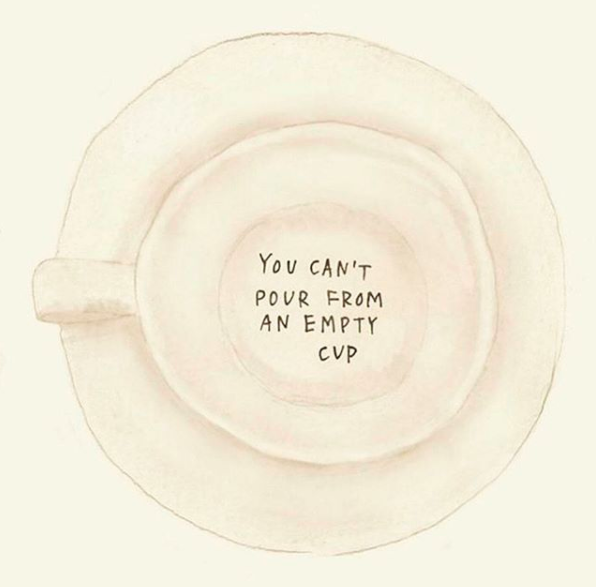Why We Eat Sugar/Fat/Salt When We're Stressed
I posted this image on social awhile back and it seemed to resonate with many of you. Why? Because we all know that it's the simple truth. When we're running on empty, we aren't able to give to others, to our work, to our hobbies and passions in the way we would like. And the simple truth is this: our health is the foundation to everything we want to accomplish. If we don't have our health, we can't live well in the moment or live out our dreams.
And the worry, anxiety, depression, fear of the unknown (to name a few) so many of us are feeling right now can cause the stress response system called the HPA axis to cause some serious health issues in your body.
My plan is to begin to connect the dots for you in a series of emails, covering how this stress response system (shorthand for the Hypothalmus, Pituitary, Adrenal Axis: HPA Axis) affects your weight, gut, mind, sex hormones, thyroid, mood, and aging.
Today, I'm going to focus on sugar, fat, and salt and how it connects to stress and weight. I'm attempting to break it down in a simple and understandable way so hoping I did that! :)
Stress affects your ability to control your desire for fat, sugar, and salt. At the same time, fat, sugar, and salt are the molecules that fuel the stress response! When stressed, you need sugar to mobilize your energy, you need salt to maintain the blood pressure that gets elevated, and you need fat to replenish the stores of sugar after the crisis is over.
But with our 24/7 busy lifestyles and the pandemic (etc.) we're all dealing with, much of the time the fight-or-flight stress response never ends. Your body doesn't calm down enough to replenish itself.
This explains why you might be craving fat, sugar, and salt all the time. This often goes hand and hand with fatigue and weight problems: perhaps you've tried lots of different diets only to lose control, or "willpower," and fall back to old patterns?
Is this familiar?
You've had a busy day...perhaps doing your own job while supervising your kids online school all day. You barely had time to eat a muffin for breakfast, but then you squeezed in a chicken salad for lunch. For a snack you had more coffee and chocolate and then ran out the door to grab groceries for dinner. You see a Snickers bar at checkout and devour it without even thinking. This is because your brain is going FEED ME.
Why? Because at the same time your cortisol is dysregulated, your willpower isn't front and center. Your survival mode is front and center. Your brain needs (even at rest) about 20% of your body's glucose (another word for sugar) so you really DID need that sugar to feed it. Your body realizes it's low in glucose, and sends a feed me right now message!
How cortisol affects willpower…
Weight, cravings, and willpower are enormously impacted by what's going on in the HPA axis. Allostatic load (the wear and tear on your body due to stress, which accumulates over time) is a major driver of fat, sugar, salt consumption.
Based on studies, women eat as a way to manage stress. In one study they reported having eaten too much or unhealthy food because of stress in the past month, far more than men (30% more), and 34% of women cite lack of willpower as a barrier to healthy choices.
56% of women say that for willpower to improve they have to have less fatigue and more energy...this goes right along with cortisol and adrenal dysregulation (along with willpower).
And if that's not enough, get this!
Stress affects willpower by affecting the functioning of neurons in the frontal cortex, leading to difficulty in making decisions. In part, because we're in the highly reactive primitive mode.
So you see? At this point, willpower really has nothing to do with it! It's your primitive mode kicking in, trying to keep you safe.
More on CORTISOL (stress)…
It modulates brain regions that stimulate hunger for sodium and energy rich substrates. Chronically high levels of Glucocorticoids affect the emotional brain, leading to difficulty in making decisions—direct connection here between craving comfort foods and what happens when we're under stress.
Cortisol also increases the pleasurability of compulsive activities AND the taste of sugar and salt—so not only do you want to have more comfort foods as a survival mechanism, but they taste better and you crave them more.
THEN, there's a reaction that happens between abdominal fat and cortisol. The fat you put on around your belly is inflammatory fat, which happens as a result of higher chronic exposure to cortisol, which makes you store more visceral abdominal fat. This increase in abdominal fat triggers ghrelin and leptin hormones, so you lose satiety and experience an increased sense of hunger. A vicious cycle!
And (this is crazy!) the abdominal fat acts as a self-soother to stress, so you eat more sugar, and more abdominal fat accumulates, and it sends more messages to your brain to be calm, SO—it's acting like a drug to calm immediate stress because stress registers in your brain as a four alarm fire, that it's not getting what it needs.
So this is how a negative feedback loop occurs: weight gain, poor will power, and cravings for fat, sugar, and salt can lead to metabolic syndrome, insulin resistance, or diabetes.
If this is you, it's not your fault! We're wired for survival, and this is one way your body is trying to take care of itself in times of stress. And when we're dealing with chronic stress (or worry, anxiety, panic), this is just one way it affects you.
So what am I to do?
Well, there's a lot you can do. You can kick in your parasympathetic nervous system (aka rest & digest system) by doing daily breath work (or hourly!), meditating, doing restorative yoga or mind-body exercise. You can take adaptogenic herbs, eat a diet that doesn't kick in inflammation (which is another stress inducer on the body), get good sleep, and so much more.
I'm offering my 6-Week Vitality group program next week. I know times are tough, and it might seem like you're just adding in "one more thing," but I promise, even if you do a fraction of this you will begin to feel better. And you get to keep all the materials you'll receive, so you can keep coming back to it.
I'm offering a pay-what-you-can option for the first time, because I want to include every woman who wants to do this, no matter what challenges are in the way (and contributing to the stress cycle!)—let's work together to lower your stress, improve your wellbeing, and restore your natural vibrancy!
Take good care of yourself, and know you're not alone.
Here's to a healthy stress response!
Stephanie

